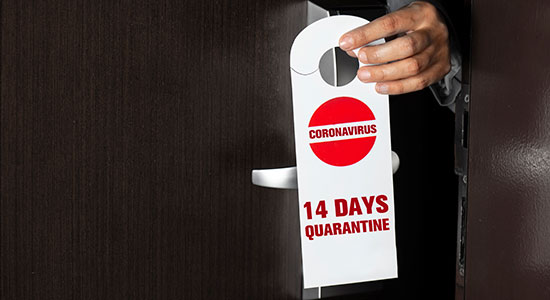
Question
I am afraid that a client who recently came into the office has the COVID-19 virus. Can I disclose this to my employees and other people who were in the office at the same time?
Answer
This raises a one-of-a-kind question regarding the confidentiality of client information and the duty of a lawyer to disclose information about a client under these unusual circumstances. Generally, a lawyer may not disclose the fact that a client came to the office because the identity of a client is confidential information under Wisconsin SCR 20:1.6, just like anything else related to the representation. The Professional Ethics Committee issued a formal opinion, EF-17-02, which clearly outlined the expectations of confidentiality even regarding the identity of a client.
We are certainly in exceptional times, which dictate a significant weighing of the duties of a lawyer to clients and to other people. SCR 20:1.6(b) creates a mandatory exception that requires the disclosure of client-confidential information under very limited circumstances. The rule provides as follows:
“SCR 20:1.6 Confidentiality.
(b) A lawyer shall reveal information relating to the representation of a client to the extent the lawyer reasonably believes necessary to prevent the client from committing a criminal or fraudulent act that the lawyer reasonably believes is likely to result in death or substantial bodily harm or in substantial injury to the financial interest or property of another.”
Under this exception to client confidentiality, an argument can be made that the lawyer has a duty to disclose the existence of a client with the COVID-19 virus because of the likelihood of the potential harm to the health of other people with whom the client may have come in contact while in the lawyer’s office. But the rule speaks to preventing the client from committing a criminal or fraudulent act and therefore would not apply.
The rule that more likely applies is SCR 20:1.6(c)(1), which gives discretion to a lawyer to disclose confidential information to avoid substantial bodily injury to another person. That subsection provides as follows:
“SCR 20:1.6 Confidentiality.
(c) A lawyer may reveal information relating to the representation of a client to the extent the lawyer reasonably believes necessary:
(1) to prevent reasonably likely death or substantial bodily harm; …”
Arguments could be made that infection by the COVID-19 virus could result in substantial bodily injury to another person, but one also could argue that the likelihood of that happening is very small. Lawyers must weigh the individual circumstances and consider whether the client, who now has been diagnosed with the virus, came in contact with other persons in the office on the day the infected client was in the office. Lawyers would be able to notify appropriate parties of possible contact with the infected person even though it would result in possibly disclosing the name of the client. A lawyer would also be able to notify the local health department to allow for contact tracing. The best strategy is to seek approval from the infected client before making a unilateral decision to disclose that information.
Lawyers are again reminded that the duty to disclose information extends only to the necessary information to accomplish the requirements of SCR 20:1.6(c)(1). The lawyer may not disclose any other information about the representation unless there is a situation in which the client was in court and was in close proximity to other individuals.
The lawyer must weigh this issue very carefully to determine the potential that other people were exposed before deciding to disclose the name of a client visiting the law office. Lawyers also should take precautions for visitors arriving at the law office and maintain a log of visitors, to assist in contact tracing when necessary.
Need Ethics Advice?
As a State Bar member, you have access to informal guidance and help in resolving questions regarding Wisconsin’s Rules of Professional Conduct for Attorneys.
Ethics Hotline: To informally discuss an ethics question, contact State Bar ethics counselors Timothy Pierce or Aviva Kaiser. They can be reached at (608) 229-2017 or (800) 254-9154, Monday through Friday, 9 a.m to 4 p.m.
